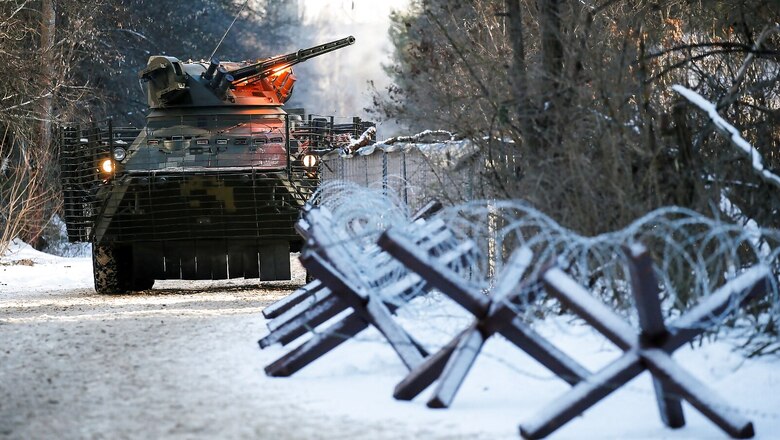
views
With the recent announcement of the US deploying over 3,000 American troops in the Eastern European countries of Poland, Germany and Romania, the possibility of a full-blown war seems increasingly plausible. The heightened tensions between the US (and Nato) and Russia involving Ukraine has the world on the tenterhooks. For India, the geopolitical crisis is not happening in a distant land and will affect her strategic interests in many ways.
After initially maintaining a diplomatic silence on the issue, India finally gave an official statement calling for a peaceful resolution. She is one of the three countries that abstained from voting on the discussion regarding Russian troop buildup along the Ukrainian border at UN Security Council, highlighting the severity of the conundrum.
As a nation with deep, favourable and strategic relations with both the US and Russia, India, unfortunately, finds herself in a difficult situation. The recent events take India back to the Cold War era, where it was expected to pick a side. However, this time, given India’s growing stature in international affairs and its dynamics with the two countries, it will be nearly impossible for her to maintain the same strategic autonomy it did last time. This is further highlighted by the United States’ statement that it would “welcome India’s role in de-escalating the situation between the countries”.
Russia’s deteriorating relations with the United States pose a significant challenge for India as closer ties with either will ensure deteriorating ties with the other. Further, China has emerged as Russia’s most prominent ally over the years. If Russia’s rivalry with the West intensifies, the trajectory of the Russia-China relationship will move in a direction that would be disadvantageous for India due to its strategic choices.
While a Russia-China-India axis in the present scenario is next to impossible, jumping on the Washington wagon has its own set of ill consequences for India vis-a-vis Moscow.
First, defence concerns. Along with being a unique and privileged strategic partner, Moscow happens to be India’s primary defence partner with 86 per cent of equipment, weapons and platforms currently in military service in India tracing their origin to Russia. Because of this dependency, in future, Russia could delay the replacement and servicing of these equipment and weapons, which, of course, won’t be in India’s interest.
US President Biden has threatened that any military conflict will lead to sanctions against Russia. India could face secondary sanctions like CAATSA (Countering America’s Adversaries Through Sanctions Act) as India has signed deals for S-400 missile system and AK-203 assault rifles with Moscow. However, India has reiterated that it “pursues an independent foreign policy that also applies to its defence acquisitions and supplies which are guided by its national security interest”
Second, energy dependability concerns. Moscow may cut gas supplies, thereby driving up oil prices in Europe, which is highly dependent on Russia for its energy needs. An oil shock can be devastating for India. It could derail India’s plans to power fertilizer plants with LNG (liquefied natural gas) as Europe buying from the open market (if Russia faces sanctions) would drive up LNG prices globally. This will put pressure on the Indian government to review taxes leading to speculations over supply disruptions.
Not only will that impact inflation, but it will also increase the amount of LPG and kerosene subsidy the government must pay. Thus, it will put a substantial financial burden on India, when it is on the path of post-pandemic recovery.
Third, an unwanted distraction. Washington’s full attention towards Europe would be dangerous for India as it distracts America from the Indo-Pacific and the challenge posed by an aggressively rising China.
Fourth, people-to-people relations. A Russian invasion of Ukraine will not only have economic and security consequences for India but will also affect its diaspora. India would have to worry about the safety of its citizens in Ukraine.
Fifth, India’s signing of the Reciprocal Exchange of Logistics Agreement (RELOS) is exceptionally crucial when China’s footprints in the Arctic are growing. It would give India access to Russian Arctic naval ports and military bases. This agreement is essential for India to counter the rising Chinese threat. India, thus, should hope for a quick de-escalation of the Ukraine crisis as worsening of the situation could impact the signing of RELOS, especially since India already has a military logistics agreement with the US, the Logistics Exchange Memorandum of Agreement or LEMOA. Any further fallout between the two nations could lead to unnecessary problems for India.
To cut a long story short, the Ukraine crisis enormously affects India and thus warrants prompt action by the establishment. Any further deterioration of relations would only obfuscate the hope for cooperation. In that case, India would have to make decisions that may impact Indian multilateralism. Or, India will have to make difficult choices to keep multilateralism intact. It will be relevant to say that it is in India’s interest that the Ukraine crisis is de-escalated at the earliest.
Harshil Mehta is an analyst who writes on international relations, diplomacy and national issues. He tweets @MehHarshil. Esha Banerji specialises in defence and strategic studies at the Savitribai Phule Pune University. The views expressed in this article are those of the authors and do not represent the stand of this publication.
Read all the Latest Opinions here
















Comments
0 comment